meatthesavages.com – Carabobo, a state located in north-central Venezuela, is a region steeped in history and natural beauty. Renowned for its pivotal role in the Venezuelan War of Independence, Carabobo is a state that has shaped the course of Venezuelan history.
The Battle of Carabobo
The most significant historical event associated with Carabobo is the Battle of Carabobo, fought on June 24, 1821. This decisive battle, led by Simón Bolívar, resulted in a decisive victory for the Venezuelan independence forces over the Spanish colonial army. The Battle of Carabobo is considered a turning point in the struggle for Latin American independence and is celebrated annually in Venezuela.
A Diverse Landscape
Carabobo boasts a diverse landscape, ranging from coastal plains to mountainous regions. The state’s coastline, with its pristine beaches and crystal-clear waters, attracts tourists from around the world. The interior of the state is characterized by fertile valleys and rolling hills, making it an important agricultural region.
Industrial Hub and Cultural Center
Carabobo is a major industrial center in Venezuela, with a strong manufacturing sector. Cities like Valencia and Maracay are hubs for industries such as automotive manufacturing, food processing, and textiles. The state is also home to several universities and cultural institutions, contributing to its intellectual and artistic development.
Challenges and Opportunities
Like many parts of Venezuela, Carabobo faces economic and social challenges, including inflation, unemployment, and crime. However, the state’s strategic location, diverse economy, and rich cultural heritage offer opportunities for future growth and development.
A Glimpse into the Future
As Venezuela navigates its economic and political challenges, Carabobo’s future remains uncertain. However, the state’s historical significance, natural beauty, and economic potential offer hope for a brighter future. By investing in education, infrastructure, and sustainable development, Carabobo can continue to play a vital role in Venezuela’s progress.

